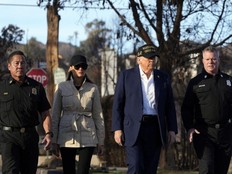Canada weighs retaliation cost against Trump tariffs as analysts warn hitting back isn’t worth it

Article content
Canada’s decision to retaliate against U.S. tariffs earlier this year appears to be driving a divergence in how President Donald Trump is dealing with America’s neighbours.
Until this week, Canada and Mexico received similar treatment in White House trade actions. Each was subject to a 25% base tariff, with a large exemption for goods shipped under the North American free trade pact known as CUSMA (or USMCA).
That changed on Thursday, when Trump granted Mexico a 90-day pause on tariff hikes while jacking up its tax on Canadian products to 35%. The administration said Canada’s higher rate was a response to fentanyl trafficking and its moves to hit back with counter-tariffs.
The situation leaves Prime Minister Mark Carney with a political dilemma. On one hand, he won an election by promising a muscular approach to the trade war, saying the government would use tariffs to cause “maximum pain” in the US. His voters remember that, and some want him to punch back.
Yet the retaliatory measures already undertaken failed to prevent further escalations. Instead, they appear to have emboldened Trump’s team to hit even harder.
U.S. administration officials including Commerce Secretary Howard Lutnick frequently talk about how only two countries retaliated against Trump’s tariffs — the other was China.
“Canada’s retaliatory trade measures against the United States further complicate bilateral efforts to address this escalating drug crisis,” the White House said in a fact sheet, referencing fentanyl. But Mexico is a much larger source of shipments of the drug into the U.S., according to Customs and Border Protection data.
Carney, an economist and former central banker, has also made it plain he believes retaliation can only go so far. In fact, his government has watered down Canada’s counter-tariffs with a number of exemptions, declined to increase them when the U.S. lifted steel and aluminum tariffs to 50% and scrapped a tax on technology services at Trump’s request.
Dominic LeBlanc, the minister in charge of trade talks, told Radio-Canada on Friday the government hasn’t made any decisions about further retaliation.
But Carney is clearly reluctant to do so — which “reflects the reality that counter-tariffs are understood to be economically harmful to the country which imposes them,” said David Collins, a professor specializing in international trade at City St George’s, University of London.
The government’s priority is to keep the CUSMA carve-out that dramatically lowers the real tax on Canadian goods. The effective U.S. tariff rate on Canada is about 6.3%, according to Bank of Nova Scotia economists.
“A more diplomatic approach is likely to bear more fruit with the Americans,” Collins said.
Retaliation Escalation
Canada imposed two rounds of counter-tariffs in March, when Justin Trudeau was in his final days as prime minister. The first placed 25% levies on about $30 billion of imports from the U.S. that included food items, clothing and motorcycles. The second came when Trump put tariffs on steel and aluminum.
Then, when Trump added tariffs to foreign automobiles, Carney essentially matched that move, imposing similar fees on U.S. cars and trucks.
But in mid-April, the government unveiled a series of exemptions for business inputs — goods imported for use in manufacturing and food packaging, as well as things needed for health care, public safety and security. Automakers such as General Motors Co. and Honda Motor Co. that make vehicles at Canadian plants were also made eligible for relief from import taxes.
The large majority of U.S. products can still enter Canada tariff-free. U.S. companies and other entities exported about $440 billion of goods and services to Canada last year — more than to any other nation.
For Canada, “the logic for escalation over cooperation is just weak,” said Oliver Lavelle, global macro strategist at Thiel Macro LLC.
Mexico’s Way
Mexican President Claudia Sheinbaum, in contrast, has never imposed counter-tariffs on the U.S.
Sheinbaum’s position is also supported by her high approval ratings, which have remained above 75% in most polls. “It’s worth saying: President Trump treats us with respect in all the calls we’ve had, and we do too,” she said during a new conference. “We may not agree, but the treatment is respectful.”
A statement issued late Thursday night by Carney’s office expressed disappointment in Trump’s tariff hike on Canada, but made no mention of retaliation. A spokesperson for Carney declined to comment further.
LeBlanc said he met with Lutnick on Tuesday night, and that Canadian officials held other meetings throughout the week, but a deal acceptable to both sides “was not yet visible.”
In his statement, Carney acknowledged that lumber, steel, aluminum and autos are still subject to U.S. levies, and said his government “will act to protect Canadian jobs, invest in our industrial competitiveness, buy Canadian, and diversify its export markets.”
‘Jitters’
But while the CUSMA exemption gives Canada some breathing room, the sectoral tariffs on steel and aluminum are still harmful and will affect economic growth if they’re in place for long, Collins said.
Avery Shenfeld, chief economist at Canadian Imperial Bank of Commerce, said the idea that Canada is getting off lightly is “both overstated and potentially premature.”
Canadian industries are more reliant on U.S. exports than their overseas competitors, and Trump could also chose to weaken the CUSMA exemption at any time, he said in a note to investors.
“We are still hopeful for a deal that relieves at least some of the pressure on base metal exporters,” Shenfeld said. “But whether any of this lasts will depend on Trump’s word, and we’ve seen how shaky that foundation can be, leaving jitters that could impact business capital spending and confidence ahead.”
—With assistance from Mario Baker Ramirez and Carolina Millan.
-
 B.C. forestry executive warns against cutting bad deal after U.S. raises tariffs
B.C. forestry executive warns against cutting bad deal after U.S. raises tariffs -
 Talks with Trump’s team constructive before boosted tariff announced, ambassador says
Talks with Trump’s team constructive before boosted tariff announced, ambassador says -
 Moe disappointed by Trump’s tariffs but says Carney should remove countermeasures
Moe disappointed by Trump’s tariffs but says Carney should remove countermeasures -
 No trade deal with U.S. better than a bad one: Canadian business groups
No trade deal with U.S. better than a bad one: Canadian business groups















Postmedia is committed to maintaining a lively but civil forum for discussion. Please keep comments relevant and respectful. Comments may take up to an hour to appear on the site. You will receive an email if there is a reply to your comment, an update to a thread you follow or if a user you follow comments. Visit our Community Guidelines for more information.